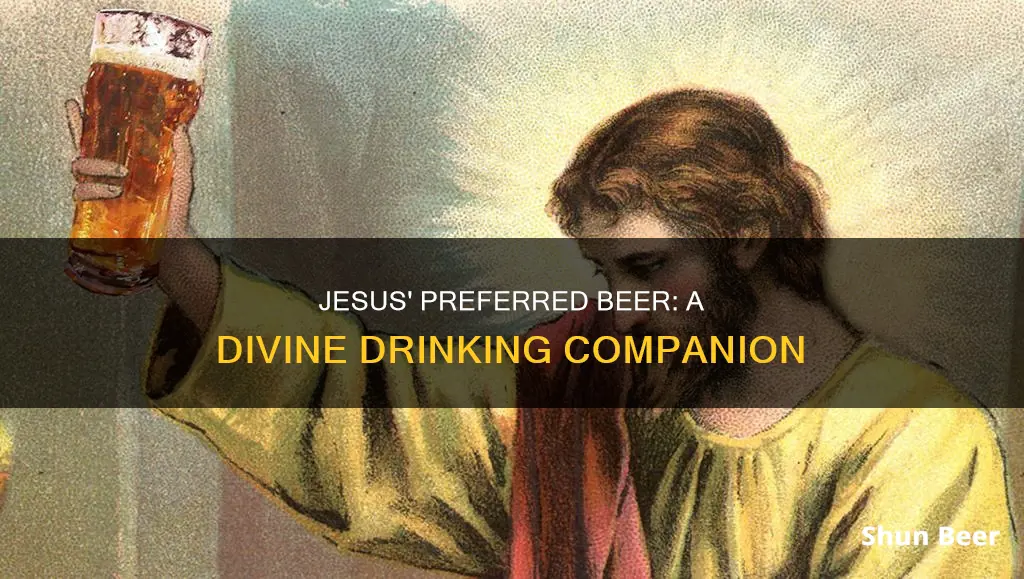
While the Bible doesn't mention Jesus drinking beer, it's likely that he drank alcohol in the form of wine. In fact, Jesus's first miracle was turning water into wine at a wedding in Cana, where it's said that the wine was fine and better than what was served before. Jesus also never condemned anyone for drinking alcohol or wine, and was himself criticised for drinking wine. However, it's important to note that drunkenness is considered a sin in Christianity.
| Characteristics | Values |
|---|---|
| Beverage | Beer, Wine |
| Drinkability | Jesus drank wine, but there is no direct evidence that he drank beer |
| Wine in Ancient Times | Very different from modern wine; was flavoured with additives like tree resins, peppers, and capers |
| Beer in Ancient Times | Lacked hops and was not served cold; was likely cheaper than wine |
What You'll Learn

Jesus drank wine, not beer
While there is no direct evidence from the Bible, it is believed that Jesus drank wine. There are several references to wine in the Gospel narratives. Jesus was around wine a great deal in his ministry, whether at weddings, meals, or the Passover celebration the night before his death.
In Matthew 26:27-29, Jesus institutes the new covenant by sharing a cup of wine with the twelve apostles. He blessed the wine and instructed the men to drink from it. He also said that he would not drink wine again until the kingdom’s fulfillment.
In Luke 7:33-34, Jesus himself says:
> For John the Baptist came neither eating bread nor drinking wine, and you say, ‘He has a demon.’ The Son of Man came eating and drinking, and you say, ‘Here is a glutton and a drunkard, a friend of tax collectors and sinners..
This indicates that Jesus drank wine, and was criticized for it. However, it is important to note that Jesus was not a drunkard. He was tempted yet sinless, so he drank wine but never took it so far that he got drunk.
Jesus's first miracle was turning water into wine at a wedding in Cana. According to Jewish wedding tradition, fermented wine was always served at weddings. The wine Christ produced was able to intoxicate, and it was apparently a "fine" wine.
While fermented grain beverages that might reasonably be called beer were available in Jesus's community, there is no reason to believe that everyone drank it. Wine was in widespread use and was used ceremonially.
Beer and Acid Reflux: Is It Safe to Drink?
You may want to see also

Wine in biblical times was very different from modern wine
The difference in alcohol content is mainly due to the use of wild or airborne yeast in biblical times, which could only ferment the sugar in grape juice to 3-4% alcohol. To exceed this level, ancient winemakers would have had to add yeast, resulting in an alcohol content of 4-11%. In contrast, modern wines often average 12-20% alcohol due to the addition of sulfur dioxide and Saccharomyces, a cultured GMO yeast, to ripened grapes with higher fructose.
The term "wine" in the Bible may not always refer to an alcoholic beverage. It could simply mean grape juice or wine with a very low alcohol content of around 10% or less. The context in which the word is used is important for understanding which type of "wine" is being referred to.
In addition to the lower alcohol content, the taste and quality of biblical wine also differed from modern wine. Wine produced in ancient Israel, for example, was often criticised for its poor quality and was often flavoured with various additives such as honey, berries, pepper, or salt to improve its taste.
Biblical wine was also consumed in a different cultural context. In ancient times, wine was commonly consumed for its safe-to-drink properties as ancient cultures lacked the technology to filter water, which could contain harmful diseases and bacteria. Wine was also an important part of religious rituals and celebrations, such as the Passover and the Lord's Supper, and was seen as a gift and a blessing from God.
Breastfeeding and Beers: How Many Are Safe?
You may want to see also

Beer was likely available in Jesus' community
While there is no direct evidence from the Bible, it is likely that beer was available in Jesus' community. Fermented grain beverages were widely available in ancient Palestine, and archaeologist Patrick McGovern confirms that wine was being produced in Galilee and modern-day Jordan during Jesus' time.
Michael M. Homan, associate professor of Hebrew Bible at Xavier University of Louisiana in New Orleans, argues that the ancient Israelites drank beer, especially on the Sabbath. Homan's detailed study paints a picture of fermented grain beverages in the ancient Near East, which were likely popular in Jesus' community. Beer was probably cheaper than wine, as barley is more plentiful than grapes, and it may have been the party drink of choice for those who wanted to get intoxicated.
The process of fermentation was essential in ancient times, as it killed harmful microorganisms in the water, making it safer to drink than raw, unfiltered water. While the ancient Near East's beer may not have been particularly palatable by today's standards, it is reasonable to assume that it was consumed for its alcohol content.
In conclusion, while we cannot be certain that Jesus drank beer, it is highly probable that it was available in his community and consumed by those around him.
Breastfeeding and Beer: Is One Drink Okay for Baby?
You may want to see also

Wine was safer to drink than water
The belief that drinking wine was safer than water was strong and old. Wine has always existed, with the first traces going back 4100 years BC, and Theophrastus writing about winemaking techniques 400 years BC. Wine was a necessity, not a luxury. Wine was also a part of Jewish wedding traditions, and it is believed that Jesus turned water into wine at the wedding at Cana.
Jesus himself drank wine, as indicated in the Bible. In Matthew 26:27-29, he shared a cup of wine with the twelve apostles, blessing the wine and instructing them to drink from it. Jesus also noted that his critics called him a "winebibber" or drunkard because he was often seen "eating and drinking" with sinners. However, Jesus was not a drunkard, and he never took wine so far that he got drunk.
The negative opinion of wine consumption only arose in the last century due to technological progress in water purification and social pressure viewing alcohol consumption as a dangerous form of deviance. Wine is now seen as a festive drink with cultural and social significance, while water is considered the epitome of normality, health, and moderation.
Beer and Keto: How Much Can You Drink?
You may want to see also

Jesus would've drunk wine to celebrate, not to get drunk
While the Bible does not explicitly mention whether Jesus drank beer, it is clear that he drank wine. In fact, Jesus's first miracle was turning water into wine at a wedding in Cana (John 2:7). This wine was fermented, as was the norm for Jewish weddings, and it was of a better quality than what had been served before.
Jesus also drank wine at the Last Supper, when he shared a cup of wine with the twelve apostles to symbolise the new covenant. Furthermore, Jesus himself stated that he ate and drank, and was criticised by the Pharisees for being a "glutton and a drunkard, a friend of tax collectors and sinners". However, these accusations were false, and Jesus never drank to the point of drunkenness.
Wine was a staple in the ancient world, and it was often safer to drink than water due to the presence of harmful microorganisms in the water. While the wine of that era was certainly alcoholic, it likely had a lower alcohol content than modern wine and was consumed for its flavour as well as its intoxicating effects.
Jesus's use of wine is consistent with the biblical view that wine is given as something to delight in and celebrate with, rather than to get drunk. Christians who choose to drink wine are encouraged to do so in moderation or to abstain totally.
Beer Drinking: Weight Loss Friend or Foe?
You may want to see also
Frequently asked questions
Yes, Jesus drank wine. He was criticized for drinking wine by his mockers (the Pharisees), who called him a "drunkard". However, there is no direct evidence that he drank beer.
The wine consumed by Jesus and his disciples during his time on Earth was likely red, and very different from the wine we drink today. It was probably shipped in ceramic or wood casks and flavoured with additives like tree resins, peppers and capers.
Yes, the wine was alcoholic. The purpose of the additives was to preserve the wine for longer, but they also had the added benefit of killing harmful microorganisms, making the wine safer to drink than raw, unfiltered water.
There is no direct evidence that Jesus drank beer, but it is likely that he preferred wine. Wine was widely used, including in ceremonies such as the Passover feast.
Although it is unlikely that Jesus drank beer, some modern beers that he might enjoy include Rogue Somer Orange Honey Ale, Baird Jubilation Ale, and Anderson Valley Summer Solstice. These beers contain ingredients that were commonly consumed during Biblical times, such as honey, coriander, and figs.







